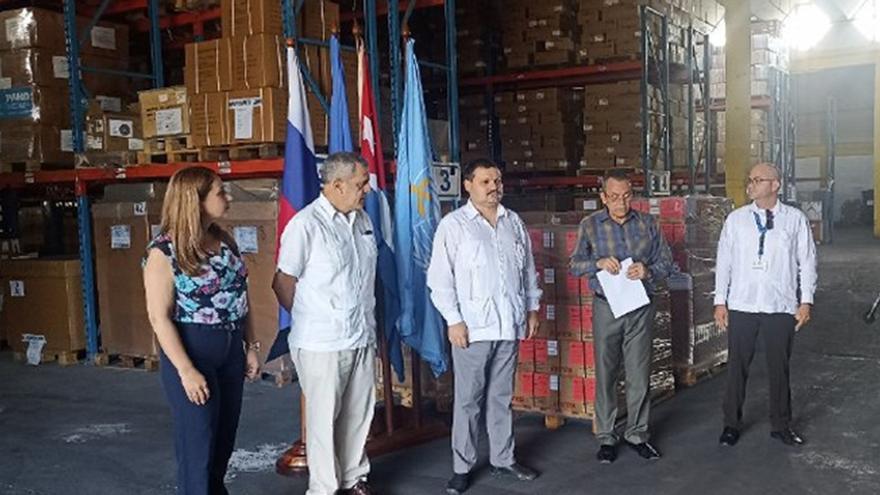
![]() 14ymedio, Havana, 16 August 2023 — Some 26 tons of medicines and medical equipment purchased with Russian funding were received this Wednesday in Havana by the authorities of the Ministry of Public Health. Moscow bought the supplies from the World Health Organization (WHO), and its diplomats on the Island attended a “thank you” ceremony in medical supply warehouses in Havana.
14ymedio, Havana, 16 August 2023 — Some 26 tons of medicines and medical equipment purchased with Russian funding were received this Wednesday in Havana by the authorities of the Ministry of Public Health. Moscow bought the supplies from the World Health Organization (WHO), and its diplomats on the Island attended a “thank you” ceremony in medical supply warehouses in Havana.
The donation, according to the official press, consists of four containers 12 meters long by two wide, with medicines that have been absent for a long time in the Island’s pharmacies. Although the quantities were not specified, Russia sent antibiotics of various types, drugs against diabetes mellitus and heart disease, analgesics, anti-inflammatories and antihypertensives.
In addition, syringes, disinfectants, instruments, surgical equipment, suture thread and materials for sanitation were received – items that, for months, Cubans must request from their relatives abroad before going to the hospital – as well as sphygmomanometers, stethoscopes, glucometers, oximeters and other materials.
The ceremony, held in the warehouses of the Medical Supply Marketing Company, was attended by the chargé d’affaires of the Russian Embassy in Cuba, Serguei Oboznov, the representative on the Island of the Pan American Health Organization, José Moya Medina, and the director of the Ministry of Public Health, José Larronte.
Although neither Cuba nor Russia revealed the cost of the medicines, the containers arrived in the middle of a 40% deficit of the basic pharmaceutical table, according to figures from the state group BioCubaFarma.
The president of the business group, Eduardo Martínez, explained in a session of the Cuban Parliament that the country lacked almost 251 drugs. The supply crisis not only affected national production but also caused numerous difficulties for imports, for which it blamed the United States embargo.
He also added that there was a lack of raw materials needed to manufacture the 369 medications that, supposedly, would be generated by BioCubaFarma. Last May, the director of Operations and Technology of that state entity, Rita María García, told the official press that the plant – which is allocated 60% of the production of basic medicines at the national level – managed to reactivate some high-demand drug production lines with the arrival of inputs purchased by the Government and other “managements,” without specifying whether they corresponded to donations.
Among the drugs that were going to be manufactured again are the injectables of aminophylline, labetalol, fenoterol and morphine of 10 and 20 milligrams (mg), widely used in hospitals for patients in intensive care. The laboratories dedicated to the manufacture of these drugs were paralyzed for almost four months because they did not have the containers – ampules, plungers and casings – due to the shortage of glass.
In this panorama, Russia’s donation represents a temporary relief, although it is expected that Moscow will continue to send health supplies to Havana – through the WHO or its regional channels – as part of its recent alliance with the Government of the Island, the most significant since the Soviet era.
Translated by Regina Anavy
____________
COLLABORATE WITH OUR WORK: The 14ymedio team is committed to practicing serious journalism that reflects Cuba’s reality in all its depth. Thank you for joining us on this long journey. We invite you to continue supporting us by becoming a member of 14ymedio now. Together we can continue transforming journalism in Cuba.
